|
|
|


|
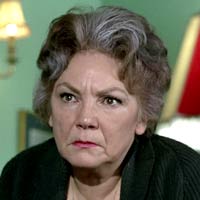 |
|
Image © ITV Studios, 1969 |
| |
Freda Jackson
Character & Episode:
Mrs Evans in The Smile Behind the Veil
Born: 29/12/1907, Nottingham, Nottinghamshire,
England (as Freda Maud Jackson)
Died: 20/10/1990, Northampton, Northamptonshire, England
Freda Jackson was character actress who was
active in the business for almost fifty years. She was born the
daughter of a railway porter in Nottingham. She grew up in the
town, attending High Pavement School and then University College
on Shakespeare Street. She qualified to become a teacher, but
her first love was the stage. Consequently, she gave up her
teaching career to move to London where she studied acting at
the Royal College of Art. Freda made her debut on the
professional stage in 1934 in Sweet Lavender at the Northampton
Repertory Theatre. After two years with the resident company
there, she first appeared London in The Sacred Flame at
the Q Theatre, after which she toured with Emlyn Williams in his
play Night Must Fall. She made her television debut in
the play Trelawny of the Wells (transmitted 9th October
1938) in a minor role. Later that year she joined the Old Vic
Company, with whom she toured Europe and Egypt during the
following year, and in 1940 she became part of the Stratford
Memorial Theatre company. Early film work included roles in Powell and
Pressburger's A Canterbury Tale (1944), Laurence
Olivier's Henry V (1944) and David Lean's Great
Expectations (1946). In July 1945 she scored a major success
at the Embassy Theatre, playing the sadistic landlady Mrs Voray
in Joan Temple's No Room at the Inn. She also starred in
the play's West End transfer and in the 1948 film adaptation.
Four years later she played a similar role, Mrs Allistair, in
the stage and screen versions of Sylvia Rayman's Women of
Twilight.
Her success on stage would, however, render her
screen appearances rather infrequent. In 1955 at Northampton
Theatre she played Marguerite Gautier in The Lady of the
Camellias, a role which she later listed as her favourite in
Who's Who in the Theatre. Later stage appearances
included the Gypsy in Camino Real (Phoenix Theatre,
1957), Duel of Angels (Apollo Theatre, 1958), Mrs
Hitchcock in Serjeant Musgrave's Dance (Royal Court
Theatre, 1959), Gunhild in John Gabriel Borkman (Mermaid
Theatre, 1961), the title role in Mother Courage (Bristol
Old Vic, 1961), Naked (Royal Court Theatre, 1963), a 1967
tour of Arsenic and Old Lace, and Maria Helliwell in
When We Are Married (Strand Theatre, 1970).
However, Freda
did figure in a modest number of television programmes,
including the small screen adaptation of Serjeant Musgrave's
Dance (an ITV Play of the Week starring Patrick
McGoohan, transmitted on 24th October 1961), a memorably
villainous turn in the opening episode of Adam Adamant Lives!
in 1966, and in the Blake's 7 episode The Keeper
in 1979. On the silver screen, she featured most notably in
The Good Die Young playing the mother of a young Joan
Collins, The Brides of Dracula and Die, Monster, Die!,
in which she played the wife of Boris Karloff's character.
Summarising her film career, David Quinlan has noted that she
"created some memorably grim portraits... less than one would
have liked, but she was really too ferocious for supporting
roles". She made her last screen appearance in Clash of the
Titans in 1981, in which she played a Stygian Witch.
In her home life, Freda was married in 1937
to the artist Henry Bird (1909-2000). The couple had one child,
their son Julian, who initially became a psychiatrist and later
switched to acting.
|
|
Philip James
Character & Episode:
Holly in When Did You Start To Stop Seeing Things?
Born: 14/05/1926, Ashfield, Sydney, New South Wales,
Australia (as Philip Richard James)
Died: 25/04/1979, Chelsea, London, England
Although well known in his native
Australia, Philip James became frustrated at the lack of
opportunity there for straight actors, with radio being the
primary medium in which they worked. In addition to his acting,
he had employed his talents as a
painter, earning part of his living as an illustrator. He could
also play the piano. Feeling that he could further his acting
career overseas, Philip emigrated to England in 1951, initially
working there in repertory theatre. He was a popular member of
the Southport Repertory Company, for whom he appeared for nine
months in 1954, and moved on from January 1955 to join the
company at the Playhouse, Newcastle. Coincidentally, his first
play at Newcastle was Escapade, which was one of the
plays produced during his time at Southport.
He has
fewer than a dozen British screen credits to his name, appearing most
notably in three episodes of the 1957 mystery drama serial
Wideawake, which also featured Jill Adams and Terence
Alexander. In 1971 he played Trevor in an episode of
Under and Over, a now-forgotten BBC comedy series about
Irish labourers working on a new London Underground tunnel.
During the same year he had a minor role in Wendy Craig’s And
Mother Makes Three. Philip was also used at times for vocal
narration work, most notably on TV commercials, the BBC documentary series
Horizon and the Going to Work series in the 1970s.
In his home life, Philip was married in
1953 to the Aberdeen actress Sheila Rennie. The couple
had a daughter, Miranda, who was born in 1954. Sadly, Philip
died young at the age of 53 in April 1979.
|
|
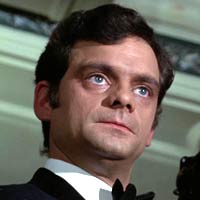 |
|
Image © ITV Studios, 1969 |
| |
Sir David Jason OBE
Character & Episode:
Abel in That's How Murder Snowballs
Born: 02/02/1940, Edmonton, London, England (as David
John White)
David Jason was brought up in
North Finchley, and as a child attended Northside Primary
School. After leaving school, he trained as an electrician while
negotiating his way into repertory theatre. He was just 15 years
old in July 1955 when noted local drama critic, W.H. Gelder,
spotted his talent and warmly praised his performance in the
Incognito Theatre Group's production of Robert's Wife by
St John Ervine. One thing that had to change when he became a
professional actor in 1965 was his name - his birth name David White was
already being used by another actor, so he had to choose
another. He opted for the name David Jason due to his liking
of the Ray Harryhausen adventure film Jason and the Argonauts
(1963).
David started his television
career in December 1965 playing the part of King Goose in the
BBC's Christmas Day pantomime Mother Goose. In 1967 he played a spoof super-hero Captain
Fantastic (and also other roles), in the children's television
sketch comedy series Do Not Adjust Your Set (Rediffusion
/ Thames). His co-stars were Eric Idle, Terry Jones, Denise
Coffey and Michael Palin. Humphrey Barclay, who recruited David
Jason to appear in the show (partly to offset the university
humour of Idle, Jones and Palin), admired David's
sense of timing. Do Not Adjust Your Set had a very
successful run on ITV, ending in 1969, and is today acknowledged
as an important progenitor of Monty Python's Flying Circus.
David was considered for the role
of Lance-Corporal Jack Jones in the BBC comedy Dad's Army
by Jimmy Perry and David Croft. Croft had been very impressed
with the actor and knew that he had the ability to play much
older than his age. The role ultimately went to Clive Dunn, but
David would become a situation comedy legend all the same...
David appeared in the BBC comedy
series Hugh and I, which starred Hugh Lloyd and Terry
Scott as two friends who lived together in south London. He also
appeared in variety shows in support of stars such as Dick
Emery, his performances catching the eye of Ronnie Barker, who
soon became a mentor to David. In 1973 David played junior
employee Granville in the first programme of the BBC comedy
anthology Seven of One, called Open All Hours
which starred Barker as the miserly proprietor of a corner shop.
Four series of Open All Hours were made from 1976 to 1985
- and David would return to the role, some years after Barker's
death, in Still Open All Hours (2013-). He also featured
as the elderly Blanco in a couple of episodes of Barker's
Porridge, a prison-based comedy, and appeared in various
disguises in The Two Ronnies show, notably as the voice
of the Phantom Raspberry Blower of Old London Town.
In 1981 he found his most enduring
and popular role, Derek 'Del-Boy' Trotter in the BBC situation
comedy Only Fools and Horses (created by John Sullivan).
Del-Boy was a wide-boy who made a dubious living in Peckham,
south London, trading in shoddy, stolen, and counterfeit goods.
In this role, Jason popularised some slang words and phrases;
examples being the mild insults "dipstick" and "plonker", and
the celebratory "lovely jubbly". His portrayal of the elder
brother to Rodney (Nicholas Lyndhurst) produced classic comic
scenes and touching serious moments.
David has also been the voice of
Mr Toad in The Wind in the Willows and starred as
detective Jack Frost on the ITV crime drama A Touch of Frost
from 1992 to 2010. He also provided the voices of cartoon
characters Danger Mouse and Count Duckula for Cosgrove-Hall
Productions in the 1980s and early 1990s.
David was made an Officer of the
Order of the British Empire (OBE) in 1993, and was knighted in
2005, both for services to drama. He has won four British
Academy Television Awards (BAFTAs), four British Comedy Awards
and six National Television Awards. These included the British
Comedy Awards Lifetime Achievement Award in 2001, and the BAFTA
Academy Fellowship Award in 2003. In 2006, David topped the poll
to find TV's 50 Greatest Stars, as part of ITV's 50th
anniversary celebrations.
David lived with his long-term
partner, actress Myfanwy Talog for eighteen years until her
death from breast cancer in 1995. He became a father for the
first time at age 61, when his girlfriend, 41-year-old Gill
Hinchcliffe, gave birth to a baby girl in 2001. In 2005, David
and Gill married. His older brother, Arthur White (1933-), is
also an actor and played Ernie Trigg alongside David in A
Touch of Frost. David wrote his autobiography, which was
released in two volumes: David Jason - My Life (Random
House UK, 2013) and Only Fools and Stories: From Del Boy to
Granville, Pop Larkin to Frost (Random House UK, 2017).
|
|
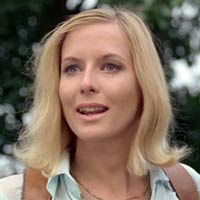 |
|
Image © ITV Studios, 1969 |
| |
Clare Jenkins
Character & Episode:
Female Hiker in The Smile Behind the Veil
Clare Jenkins is a minor supporting actress
with little over a dozen television credits to her name. Clare trained
at RADA and graduated in 1964, and her screen career lasted
mainly from the mid-Sixties to the early Seventies. Her best remembered roles
were in the Doctor Who, in which she played opposite the
William Hartnell and Patrick Troughton incarnations of the
famous Time Lord: in 1966 she portrayed Nanina in The Savages,
then in 1968 she played Tanya Lernov in The Wheel in Space.
She would reprise this latter role in a short scene in the final
episode of The War Games a year later, when the Doctor's
companion Zoe is returned to the space station where she had
joined the TARDIS crew. She was also a regular in the Anglia
Television soap opera Weaver's Green (as Carol Thorpe,
1966) and also appeared in Crossroads as Pauline Carr in
1972. Clare's last credited screen appearance was in the ITV Sunday
Night Theatre play The Death of Adolf Hitler in 1973.
|
|
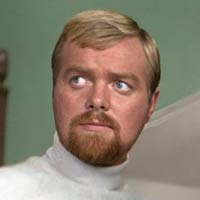 |
|
Image © ITV Studios, 1969 |
| |
Peter Jesson
Character & Episode:
Hooper in The Smile Behind the Veil
Born: 03/03/1937, London, England (as Peter George
Henry Jones)
A tall actor standing at 6
feet 2 inches, Peter Jesson was generally seen on film during the
Sixties in minor supporting roles. His early television works
included
appearances in the BBC Schools drama serial Strife (Act
Two, transmitted on 2nd February 1960),
Spy-Catcher (Like Father, Like Son, 3rd March 1960)
and in the first two episodes of Rob Roy (9th and 16th
April 1961). He followed this up with one-off roles in the
popular BBC police dramas
Dixon of Dock Green (New Man in the Manor, 9th
December 1961) and Z Cars (Big Catch, 30th January 1962). He had
a small part in the comedy film Twice Round The Daffodils
later in 1962. The following year he played Mr Top in Nurse
on Wheels and a car salesman in Carry On Cabby. This
latter engagement would prove to be the first of three
contributions to the Carry On series, though his last
appearance, in Carry On Follow That Camel in 1967, ended
with his scenes deleted from the final version. Peter also
worked for Gerald Thomas and Peter Rogers (director and producer
of the Carry On series) in the comedy The Big Job
in 1965.
In 1968 he filmed his scenes for Randall and Hopkirk
(Deceased), though his episode, The Smile Behind the Veil,
would be held back in the transmission order and was not aired
until 1970. In 1968 Peter appeared as Hans in four episodes of the television series Spindoe, which starred
Ray McAnally in the lead role. His last known screen appearance
followed in 1973 when he appeared in an episode of Menace.
Peter is married with three children.
|
|
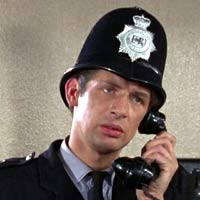 |
|
Image © ITV Studios, 1969 |
| |
Robin John
Character & Episode:
Constable Jenkins in Whoever Heard of a Ghost Dying?
Robin John was an occasional actor
who appeared in a dozen or so television and film productions
between the mid-Sixties and the early Seventies. He trained at
the Central School for Speech and Drama, graduating in 1965.
The
year in which he
made his Randall and Hopkirk (Deceased) appearance – 1969
– was
his busiest year, also appearing in The Power Game (Without
Prejudice), The Mind of Mr J.G. Reeder (The Troupe)
and Department S (The Man from 'X') on television
and the feature film Crossplot, which starred Roger
Moore. Robin made his television debut in 1965 appearing the
series The Flying Swan for BBC Midlands. Other
appearances included Adam Adamant Lives! (Death Has a
Thousand Faces), Mickey Dunne and Compact. His
only other credited feature film appearance aside from Crossplot
was in Hammer Films' Creatures the World Forgot (1971). His last
known credited screen appearance was as a Cossack Horseman in the ten-minute
experimental film The Reprieve in 1972, made by the
National Film and Television School - in one continuous take and
in Russian. That really does qualify as "experimental"!
|
|
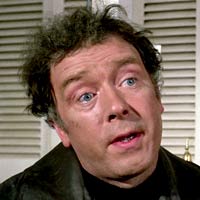 |
|
Image © ITV Studios, 1969 |
| |
Freddie Jones
Character & Episode:
James McAllister in For the Girl Who Has Everything
Born: 12/09/1927, Longton, Stoke-on-Trent, Staffordshire,
England
(as Frederick Charles Jones)
Died: 09/07/2019, Bicester, Oxfordshire, England
Upon leaving school, Freddie
Jones worked briefly for a consumer electronics goods vendor in
Longton, and then for many years as a laboratory assistant with a firm making ceramic
products, but soon he was set upon on a different
path. Freddie's girlfriend of the time suggested he join a drama
course and Freddie was soon performing in repertory theatre in
Shelton and with other local theatre groups. He went on to train at the prestigious Rose Bruford College
of Speech and Drama for three years.
In his final year at Rose Bruford College - 1958 - he won the
college's Lionel Bruford Prize, awarded in honour of Rose
Bruford's brother - for the best performance in a London
production. His first work after completing his time at the
college was with the Art's Council's autumn 1958 tour which
commenced in late September in Middlesbrough and ran until late
November, with a three-week run in the north east and then a
seven-week tour of Wales, averaging two nights at each theatre
on the tour. Although known through the vast majority of his career as
Freddie Jones, the stage name with which he commenced his
career, he acted for a short time between 1959 and autumn 1962
as Frederick Jones, his birth name.
His first screen appearance was in March 1960 in the BBC Schools
Television serialisation of Androcles the Lion. Since then Freddie
garnered well over two hundred television and screen
appearances. He was a solid and busy actor for over five
decades, during which time he featured in many notable
series including The Avengers, The Caesars,
Space: 1999, The Ghosts of Motley Hall and, from
2005 to 2018, the long running Yorkshire Television soap opera
Emmerdale, in which he played regular character Sandy
Thomas. Amongst his film credits, Freddie appeared in
The Man Who Haunted Himself (1970), The Satanic Rites
of Dracula (1973) and Zulu Dawn (1979).
He also
enjoyed a long association with the maverick American film
director David Lynch, which saw him feature in many of his
productions: The Elephant Man (1980), Dune (1984),
Wild At Heart (1990), Lynch's short-lived TV series On
The Air (1992) and his short film Hotel Room (1993).
Along with Dudley
Sutton, Freddie is the only actor to have appeared in both the
original Randall and Hopkirk (Deceased) and its remake of
2000-2001 with Bob Mortimer and Vic Reeves.
In his private life, Freddie married Jennie
Heslewood, a former actress, in 1965, and the couple had three
sons - two, Toby and Caspar, are actors, while the other,
Rupert, is a director. Freddie died on 9th July 2019
after a short illness.
|
|
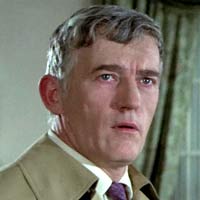 |
|
Image © ITV Studios, 1969 |
| |
Patrick Jordan
Character & Episode:
Smart in A Disturbing Case
Born: 20/10/1923, Hendon, Middlesex,
England
(as Albert Patrick Jordan)
Died: 10/01/2020, Alpheton, Suffolk, England
The son of Albert Jordan, a regimental
sergeant major, Patrick Jordan was raised in Harrow, Middlesex.
A childhood accident, which occurred while playing bows and
arrows with his two brothers, left him with a distinctive scar
on his right cheek. At the outbreak of the Second World War,
Patrick enlisted with the Army, despite being only 15 years of
age.
Four years later, he was injured while stationed in North
Africa.
Patrick trained to be an actor and made his
stage debut in a 1946 Old Vic production of Richard II at
the New Theatre, which was directed by Ralph Richardson and
featured Harry Andrews and Alec Guinness. He went on to perform
in other plays for the Old Vic Company, including Cyrano de
Bergerac and The Government Inspector, a play which
also featured Renée Asherson in its cast. Patrick forged a
lifelong friendship with Asherson and also with Guinness.
On the big screen, Patrick contributed to
many films, notably in wartime dramas such as The Battle of
the River Plate (1956), The Longest Day (1962),
The Heroes of Telemark (1965), Play Dirty (1969), and
Too Late the Hero (1970). He also appeared in Bunny
Lake is Missing (1965), the fifth James Bond film You
Only Live Twice (1967), The Pink Panther Strikes Again
(1976), and is well remembered for his uncredited speaking role
as Imperial Officer Cass, an aide to the Grand Moff Tarkin
(Peter Cushing), in Star Wars (1977), a role secured for
him by his friend Alec Guinness.
Patrick's television
appearances included contributions to Danger Man (1965),
The Prisoner (1967), UFO (1971) and The
Adventurer (1973). He also played two different regular
characters in the ATV soap opera Crossroads. His last
television credit was in The Bill in 1995.
In his personal life, Patrick was married
to the prolific children’s book illustrator Margery Gill
(1925-2008). The couple had two daughters, Tessa (born in 1948),
who also became an illustrator of children's books, and Ros (who
died in 1996). Patrick passed away at the age of 96
having been retired since 1995.
|
Section compiled by Darren Senior
Additional research and presentation by Denis Kirsanov and Alan Hayes
|
|
|
Back to Top |
|